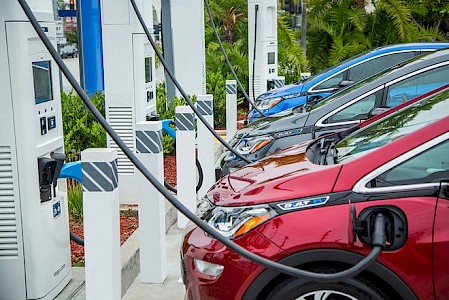Industry News
Gulf Oil Lubricants exploring opportunities in EV charging space
 Hinduja group company, Gulf Oil Lubricants India has partnered with Gulf Oil International for investing and exploring opportunities in the electric vehicle charging space. Gulf Oil Lubricants India Ltd (GOLIL) has entered into an agreement with Gulf Oil International (GOI) to participate and co-invest in Gulf Oil International's recent investment along with the Clean Growth Fund (CGF - a UK venture capital fund) in a UK-based smart energy and electric vehicle technology company Indra Renewable Technologies.
Hinduja group company, Gulf Oil Lubricants India has partnered with Gulf Oil International for investing and exploring opportunities in the electric vehicle charging space. Gulf Oil Lubricants India Ltd (GOLIL) has entered into an agreement with Gulf Oil International (GOI) to participate and co-invest in Gulf Oil International's recent investment along with the Clean Growth Fund (CGF - a UK venture capital fund) in a UK-based smart energy and electric vehicle technology company Indra Renewable Technologies.
The charging station market, as per estimates, is expected to have a good potential in coming years, wherein around 50-60 per cent is expected to be in residential charging solutions which is where Indra is positioned to play, the release added. "With the evolving EV space in India, where charging options will become an important decision criterion, we are excited about this association," said Ravi Chawla, Managing Director and Chief Executive
Gulf India will become a shareholder with CGF and GOI in Indra, alongside OVO Group, which provided seed capital and technical support to Indra via Kaluza, its technology business. The prime focus for Gulf India would be the passenger car and light commercial vehicle residential charging segment with Indra's smart chargers while it evaluates opportunities in the two-wheeler segment.
The market is also expected to disrupt with new technologies such as V2G (Vehicle to Grid) chargers which are already developed by Indra and could support the power requirements of individual homes as a backup and also opportunities to form partnerships with potential microgrid solution providers in the future.
Indra's home-grown R&D and technology and OEM approvals will be critical success factors in this endeavour.
Gulf Oil Lubricants India Ltd. markets a range of automotive and industrial
Shell ordered to reduce carbon emission
 At a courtroom in The Hague, judge Larisa Alwin read out a ruling which ordered Shell to reduce its planet-warming carbon emissions by 45% by 2030 from 2019 levels
At a courtroom in The Hague, judge Larisa Alwin read out a ruling which ordered Shell to reduce its planet-warming carbon emissions by 45% by 2030 from 2019 levels
"The court orders Royal Dutch Shell, by means of its corporate policy, to reduce its CO2 emissions by 45% by 2030 with respect to the level of 2019 for the Shell group and the suppliers and customers of the group," Alwin said.
Earlier this year Shell set out one of the sector's most ambitious climate strategies. It has a target to cut the carbon intensity of its products by at least 6% by 2023, by 20% by 2030, by 45% by 2035 and by 100% by 2050 from 2016 levels.
But the court said that Shell's climate policy was "not concrete and is full of conditions... that's not enough."
"The conclusion of the court is therefore that Shell is in danger of violating its obligation to reduce. And the court will therefore issue an order upon RDS," the judge said.
The court ordered Shell to reduce its absolute levels of carbon emissions, while Shell's intensity-based targets could allow the company to grow its output in theory.
"This is arguably the most significant climate change-related judgment yet, which emphasizes that companies and not just governments may be the target of strategic litigation which seeks to drive changes in behaviour," said Tom Cummins, dispute resolution partner at law firm Ashurst. Shell said that it would appeal the verdict and that it has set out its plan to become a net-zero emissions energy company by 2050.
Climate Litigation
The lawsuit, which was fled by seven groups including Greenpeace and Friends of the Earth Netherlands, marks a first in which environmentalists have turned to the courts to try to force a major energy firm to change strategy.
It was filed in April 2019 on behalf of more than 17,000 Dutch citizens who say Shell is threatening human rights as it continues to invest billions in the production of fossil fuels.
"This is a huge win, for us and for anyone affected by climate change", Friends of the Earth Netherlands director Donald Pols told Reuters.
"It is historic, it is the first time a court has decided that a major polluter has to cut its emissions," Pols added.
Michael Burger, head of the Sabin Center for Climate Change Law at Columbia Law School said that "there is no question that this is a significant development in global climate litigation, and it could reverberate through courtrooms around the world."
Burger is also a lawyer representing local governments in the United States in climate change lawsuits, including against Shell.
Shell, which is the world's top oil and gas trader, has said its carbon emissions peaked in 2018, while its oil output peaked in 2019 and was set to drop by 1% to 2% per year.
While its climate targets surpass those of its U.S. rivals such as Exxon and Chevron, which ignore emissions from the combustion of its fuels, the Anglo-Dutch company's spending will remain tilted towards oil and gas in the near future.
A rapid reduction in its carbon dioxide emissions would effectively force it to quickly move away from oil and gas.
